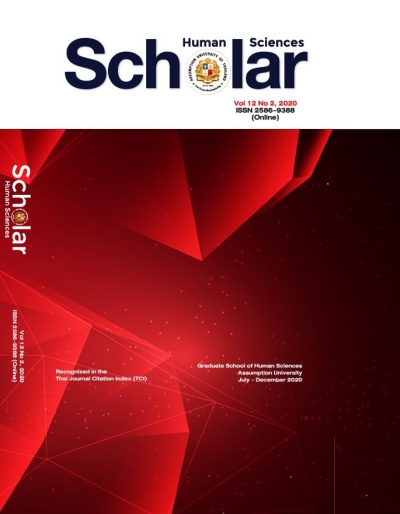A Grade-Level Comparative Study of English Communication Anxiety and English Oral Skills Self-Efficacy of English Program Grades 7 to 9 Students at the Demonstration School of Ramkhamhaeng University
Keywords:
English Communication Anxiety, English Oral Skills Self-Efficacy, Demonstration School of Ramkhamhaeng UniversityAbstract
This study investigated students’ perception of English communication anxiety and of English oral skills self-efficacy, and subsequently conducted a grade-level comparison in terms of these variables. The sample of this study consisted of 66 English Program Grades 7 to 9 students at The Demonstration School of Ramkhamhaeng University in the academic year 2018 - 2019. The study employed a quantitative research methodology utilizing two questionnaires to collect data. The first questionnaire focused on issues relevant to anxiety, shyness, and physical reactions towards speaking in an English language classroom. The second questionnaire asked students to make judgments about their capabilities to accomplish specific tasks using English in listening and speaking contexts. The quantitative data was analyzed by using descriptive statistics – means and standard deviations, while statistical hypotheses were tested by One-way Analysis of Variance (ANOVA). There were four main findings. First, the respondents had an overall moderate level of English communication anxiety. Second, the respondents had an overall high level of English oral skills self-efficacy. Third, there was not a significant grade-level difference in English communication anxiety. Finally, there was not a significant grade-level difference in English oral skills self-efficacy. The study concludes with recommendations for practice and for future research.
References
Baker, W. (2012). From cultural awareness to intercultural awareness: culture in ELT. ELT Journal, 66(1), 62-70.
Bandura, A. (1977). Self-efficacy: Toward a unifying theory of behavioral change. Psychological Review, 84(2), 191-215.
Bandura, A. (1989). Social cognitive theory. In Annals of child development (Vol. 6, pp. 60). Greenwich, CT: JAI Press.
Bandura, A. (1993). Perceived self-efficacy in cognitive development and functioning. Educational Psychologist, 28(2), 117-148.
Bandura, A. (1994). Self-Efficacy. In V. S. R. (Ed.) (Ed.), Encyclopedia of Human Behavior (Vol. 4, pp. 71-81). New York: Academic Press. (Reprinted from: Reprinted in H. Friedman [Ed.] Encyclopedia of Mental Health San Diego: Academic Press, 1998).
Bandura, A., & Adams, N. E. (1977). Analysis of self-efficacy theory of behavioral change. Cognitive Therapy and Research, 1(4), 287-310.
Cao, Y. (2011). Comparison of two models of foreign language classroom anxiety scale. Philippine ESL Journal, 7, 73-93. doi:https://www.philippine-esl-journal.com/wp-content/uploads/2014/01/V7-A4.pdf
EF Education First. (2017). EF EPI 2017 - EF English proficiency index. Retrieved from https://www.ef.co.th/epi/regions/asia/thailand/
Effiong, M. (2013). Factors influencing foreign language classroom anxiety: An investigation of English learners in four Japanese universities. (Doctoral dissertation), University of Southampton, Southampton, Hampshire, England. Retrieved from https://eprints.soton.ac.uk/367372/
Estar, S. (2005, April 14, 2005). What is linguistics knowledge? Retrieved from https://rafangel.wordpress.com/2005/04/14/bella/
Folk, J., & Folk, M. (2018, September 3, 2018). Anxiety. What is anxiety? Retrieved from https://www.anxietycentre.com/anxiety.shtml
Horwitz, E. K. (1988). The Beliefs about language learning of beginning university foreign language students. The Modern Language Journal, 72(3), 283-294.
Horwitz, E. K. (2010). Foreign and second language anxiety. Language Teaching, 43(2), 154-167.
Horwitz, E. K., Horwitz, M. B., & Cope, J. (1986). Foreign language classroom anxiety. The Modern Language Journal, 70(2), 125-132.
Horwitz, E. K., & Young, D. J. (1991). Language anxiety: From theory and research to classroom implications. Upper Saddle River, NJ Prentice-Hall, Inc.
MacIntyre, P. D. (1995). How does anxiety affect second language learning? The Modern Language Journal, 79(1), 90-99.
Manachon, N. (2015). A comparative study of attitudes toward English as a foreign language learning between upper secondary students in science-mathematics and arts-language programs at The Demonstration School Of Ramkhamhaeng University Thailand. (master's thesis), Assumption University, Bangkok, Thailand.
Niamthet, T. (2016). A survey of awareness towards English pronunciation among Thai international workers in exhibition services. (master's thesis), Thammasat University, Bangkok, Thailand.
O'Connor, M. (2016). English Speaking Anxiety of English Program Grade 9 Students at Burirampittayakhom School. (master's thesis), Buriram Rajabhat University, Buriram, Thailand.
Pajares, F. (1996). Self-efficacy beliefs in academic settings. Review of Educational Research, 66(4), 543-578.
Parsons, B. S. (2018). A comparative study of mathematics self-efficacy and anxiety levels of grades 10-12 students at thai christian school before and after supplemental practice use of the mathematics e-learning application website khan academy. Scholar: Human Sciences, 10(2), 207-218.
Partridge, B. J. (2015). A comparative study of students' foreign language classroom anxiety through cooperative learning on grades 10 students at saint joseph bangna school, thailand. Scholar: Human Sciences, 7(1), 172-185.
Rocio, S. A. (2012). The importance of teaching listening and speaking skills. (master’s thesis), Complutense University of Madrid, Madrid, Spain. Retrieved from https://www.ucm.es/data/cont/docs/119-2015-03-17-12.RocioSeguraAlonso2013.pdf
Schunk, D. H., & Pajares, F. (2002). The development of academic self-efficacy. In A. Wigfield & J. S. Eccles (Eds.), A, Vol. in the educational psychology series. Development of achievement motivation (pp. 15-31). San Diego, CA, US: Academic Press.
Scovel, T. (1978). The effect of affect on foreign language learning: A review of the anxiety research. Lanague Learning, 28(1), 129-142.
Tanveer, M. (2007). Investigation of the factors that cause language anxiety for ESL/EFL learners in learning speaking skills and the influence it casts on communication in the target language. (master's thesis), University of Glasgow, Glasgow, UK.
Tuncer, M., & Dogan, Y. (2015). Effect of foreign language classroom anxiety on Turkish university students' academic achievement in foreign language learning. Journal of Education and Training Studies, 3(6), 114-119.
Usher, E. L., & Pajares, F. (2009). Sources of self-efficacy in mathematics: A validation study. Contemporary Educational Psychology, 34(1), 89-101.
Yu, Y., Xu, L., & Zheng, C. (2017). The design and application of the self-efficacy questionnaire for english language learners in china. Paper presented at the International Conference on Education Science and Education Management (ESEM), Guilin, People's Republic of China. http://dpi-proceedings.com/index.php/dtssehs/article/download/15072/14585
Zimmerman, B. J. (2000a). Attaining self-regulation: A social cognitive perspective. In Handbook of Self-Regulation (pp. 13-39). New York, New York: Academic Press.
Zimmerman, B. J. (2000b). Self-efficacy: An essential motive to learn. Contemp Educ Psychol, 25(1), 82-91.




